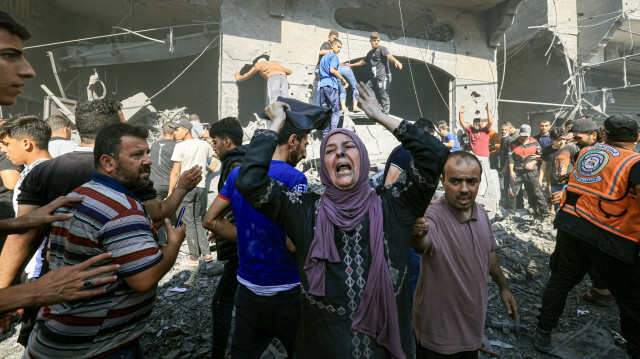
People are unsure why Palestinians are fighting due to lack of context in stories on Palestine, says Mike Berry
Western media portrays the events of Oct. 7 last year as having triggered the Israeli-Palestinian conflict, says Mike Berry, a lecturer at Cardiff University's School of Journalism, Media and Cultural Studies.
"Palestinians would obviously contest this, as they see themselves as resisting Israeli actions going back decades," Berry told Anadolu.
Major European media outlets are facing mounting criticism from experts and former UN officials for their coverage of the Israel-Hamas conflict, with researchers highlighting patterns of systematic bias in reporting that some warn could amount to complicity in obscuring war crimes.
Berry has documented significant disparities in how Western media outlets report on Israeli and Palestinian casualties, with his research revealing striking differences in language choices and historical context presentation.
"Initial research on news coverage since Oct. 7, 2023 suggests that certain emotive words such as 'murder,' 'massacre' and 'atrocity' are frequently used by journalists themselves to describe the deaths of Israelis but are almost never used to describe the deaths of Palestinians," he said.
Berry's study also found critical gaps in the historical context.
"Western media have featured very little context of the events leading up to the attack (by the Palestinian group Hamas) such as the 17-year blockade of Gaza or Israel's 57-year occupation of Palestinian land," he said.
The impact of this selective context is significant, according to Berry's focus groups' findings.
"This absence of historical context had two critical effects. Firstly, it disadvantaged the Palestinians by removing their rationale for action. People in our focus groups just couldn't understand why the Palestinians were fighting and thought they were just naturally aggressive or bad neighbors," he said.
The research also revealed broader implications for public understanding.
"The lack of historical context left people enormously confused about basic aspects of the conflict, such as the nationality of the settlers and what occupation even meant. This had the impact of inhibiting an informed discussion of how the conflict could be brought to an end," Berry said.
- Pro-Israel stance in reports
A pro-Israel stance is evident in the reporting of leading media outlets in many European countries.
The British Guardian newspaper characterizes Israel's attacks on Gaza as a “military operation” and Hamas's actions as “terrorist attacks.”
A Turkish-language report by German state broadcaster Deutsche Welle (DW) titled “Which actions are considered war crimes?” argues that Israeli attacks may not fall within the scope of “war crimes.”
International media outlets such as the BBC and CNN, meanwhile, refer to Israelis as “killed” and Palestinians as “dead.”
The BBC frames the Israeli-Palestinian conflict as a “bilateral dispute” and rarely emphasizes the fact of occupation. Describing Israeli settlements in the West Bank as “disputed territories,” it does not mention the fact that these settlements are illegal under international law.
- Media organizations may face legal consequences
Meanwhile, media workers challenging these editorial positions have faced professional consequences.
A BBC reporter was dismissed over pro-Palestinian social media posts, while Deutsche Welle terminated employees who criticized Israeli actions.
Italian journalist Raffaele Oriani resigned from La Repubblica, saying "this massacre has media protection. We are providing that protection.”
A recent raid on the satellite news network Al Jazeera's West Bank office by Israeli forces has further highlighted concerns about press freedom in the region.
Israel has killed more than 170 journalists in Gaza since the conflict's escalation, a fact that media watchdogs say has received insufficient attention from Western news outlets.
Some journalists have taken action in response to this partisan stance.
CNN staff signed a letter protesting the network's perceived pro-Israel bias, while Palestinian youth launched the "We Are Not Numbers" project to humanize statistics and share personal stories from Gaza.
Craig Mokhiber, former director of the New York office of the UN High Commissioner for Human Rights, who resigned after 32 years over the UN's response to events in Gaza, warned that media organizations could face legal consequences similar to those seen in the Nuremberg and Rwanda tribunals.
Israel's brutal onslaught on the Gaza Strip has killed more than 42,700 people, mostly women and children, and injured nearly 100,300 others since a cross-border incursion last October by Hamas.
The Israeli war on Gaza has displaced nearly the entire population of the enclave amid an ongoing blockade that has led to severe shortages of food, clean water and medicine.
Israel also faces a genocide case at the International Court of Justice for its actions in Gaza.
Hello, the comments you share on our site are a valuable resource for other users. Please respect other users and different opinions. Do not use rude, offensive, derogatory, or discriminatory language.
The floor is all yours.








